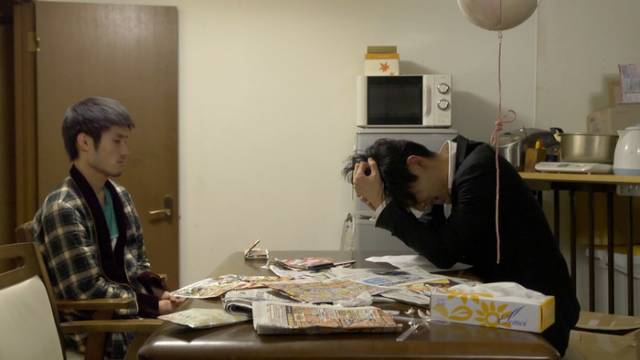
 In Ow, the debut feature from director Yohei Suzuki, a mysterious orb throws a wrench into the lives of an average Japanese family. But in many ways, the orb simply reveals the extent to which the Japanese economy and life in general has stunted the growth of the family.
In Ow, the debut feature from director Yohei Suzuki, a mysterious orb throws a wrench into the lives of an average Japanese family. But in many ways, the orb simply reveals the extent to which the Japanese economy and life in general has stunted the growth of the family.
The first to fall victim is Tetsuo, twenty-seven and unemployed, who is fretted over by his family but on the whole seems thoroughly untroubled by his jobless state. One day he is joined in bed by his girlfriend and after a very childlike romp in the sheets, he looks up to the corner of his room and sees the orb. He freezes, unable to change his facial expression or even lower his pointing finger. His girlfriend cannot help but look in that direction and freezes as well. Next, Tetsuo’s father comes home determined to make a confession; he lost his job a month ago and was too ashamed to tell his family, so he’s been going to an employment center and pretending he still had his job. He bursts into the room and unburdens himself before he notices his vacant audience and turns, becoming the orb’s third victim.
Eventually the police are called, who have no idea what to make of the situation. Their confusion turns to tragedy when a frantic officer accidentally shoots Tetsuo’s father. Thereafter, the film turns into a satire of sorts of police procedurals. The police bungling goes unnoticed until a journalist starts to investigate on his own and tells the truth to Tetsuo’s family, who are trying to move on from the incident.
Ow is a film of comic unease and building tension, especially in the first act, but I didn’t find the tension to be adequately used or resolved in any way. After the intriguing beginning, the second and third act often feel like wheel-spinning, as both police and journalists (and the audience) try to figure out just what happened. The film uses documentary-like visual labels to identify different characters as types, signifying a sociological message about Japanese culture that I probably would have appreciated more with a stronger grasp of the cultural context, although the action is so vague that I suspect it could be read as a comment on almost anything.
As it is, the family tries to muddle on with their vegetable son. Sometimes a family member will grow so frustrated that they grab Tetsuo and try to shake him awake, to say something, reveal something. I sympathized with the family as I felt the same way about the film, wanting it to reveal something, but alas, it remained more or less inert despite its opening intrigue. The film feature some shrewd camera work, some existential comedy, and it will certainly be enjoyed by those with a desire to luxuriate in one of the strangest film atmospheres to come along in some time.